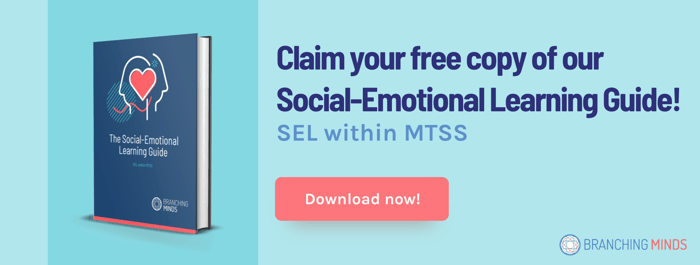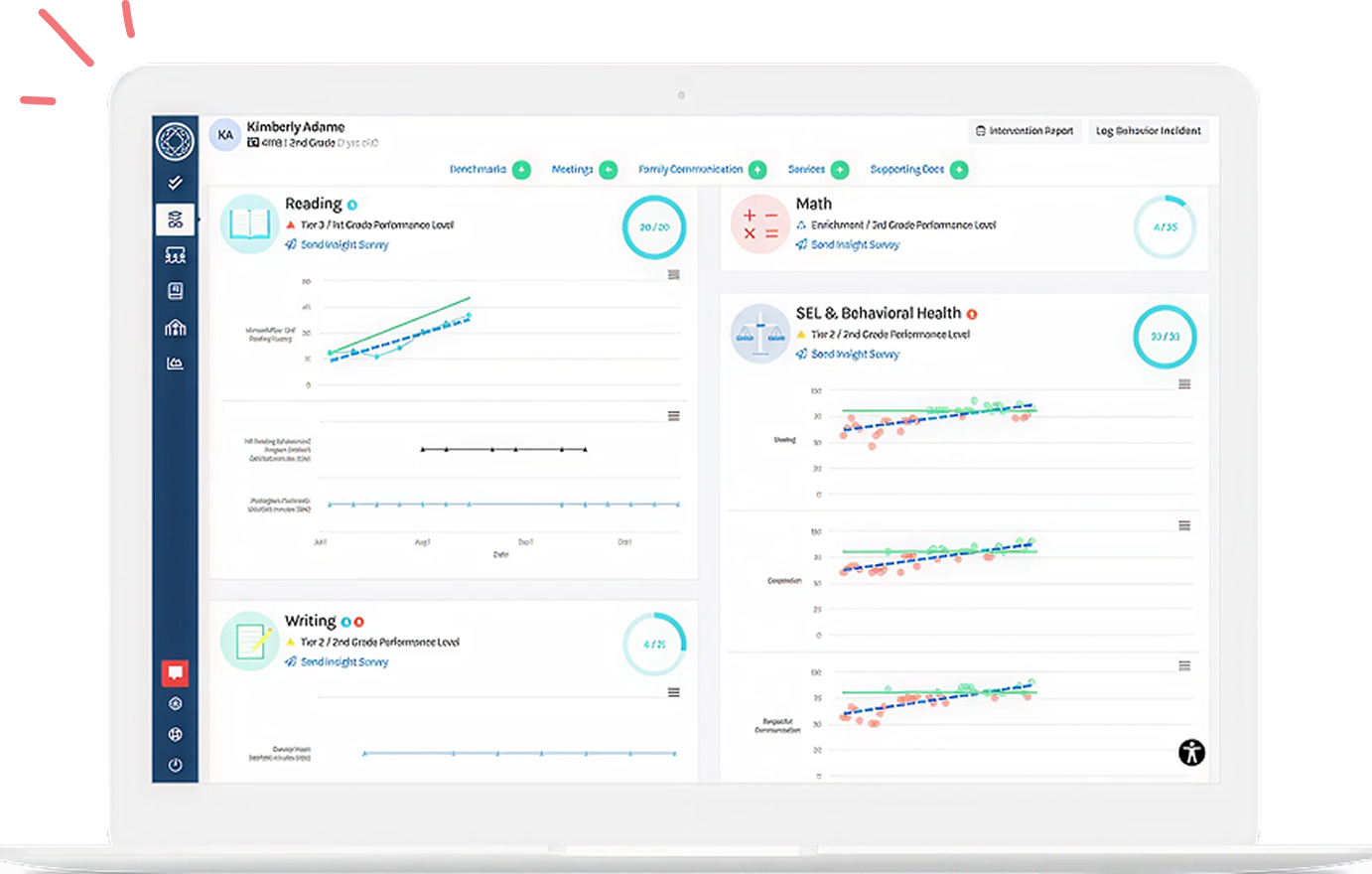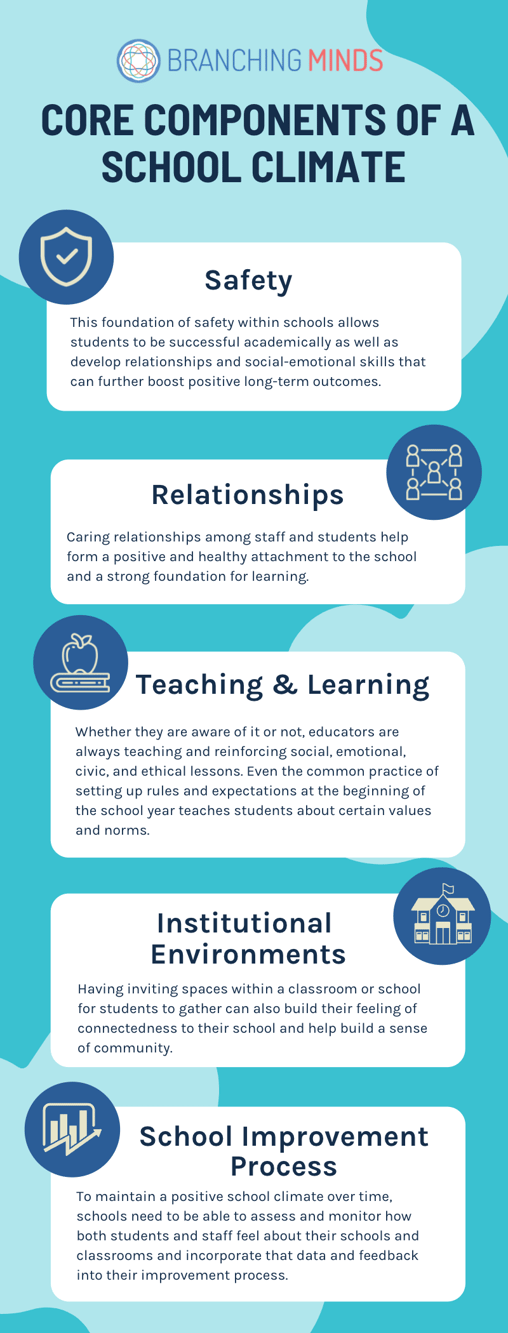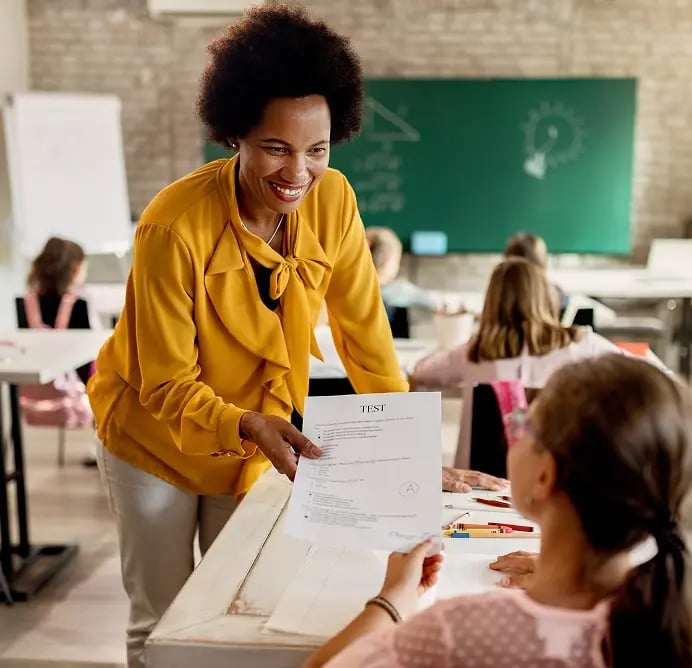When developing strategies to improve academics and social-emotional learning, it’s easy to get stuck focusing on only the curriculum, lessons, and approaches we use with individuals or groups of students. Sometimes, it can be beneficial to take a step back and think about the context and environment in which students are learning and how those can be improved.
School Climate SEL: Key Takeaways
- This foundation of safety within schools allows students to be successful academically as well as develop relationships and social-emotional skills that can further boost positive long-term outcomes.
- Caring relationships among staff and students help form a positive and healthy attachment to the school and a strong foundation for learning. Whether they are aware of it or not, educators are always teaching and reinforcing social, emotional, civic, and ethical lessons.
- Having inviting spaces within a classroom or school for students to gather can also build their feeling of connectedness to their school and help build a sense of community.
- To maintain a positive school climate over time, schools need to be able to assess and monitor how both students and staff feel about their schools and classrooms and incorporate that data and feedback into their improvement process.
What Is School Climate?
The National School Climate Center defines school climate as being “based on patterns of people’s experiences of school life and reflect norms, goals, values, interpersonal relationships, teaching and learning practices, and organizational structures.”
Sometimes you can get a sense of a school’s climate just by spending a few moments in the building. Observing the interactions among students and staff can provide a glimpse into how individuals feel toward their school. But accurately describing the overall climate of a school can also be challenging, especially because different individuals or groups within a school might have very different perceptions of the school environment.
Academic scholars and educational experts who study schools and classrooms have identified five core components that contribute to the overall climate of a school:
- Safety
- Relationships
- Teaching and Learning
- Institutional Environments
- School Improvement Process
Understanding each of these five components can provide insight into the climate and culture of a school and allow educators to leverage them to improve the school climate for students, teachers, and staff and foster social-emotional and academic growth.
Below, we break down each of the five components of school climate and highlight how schools can improve on each area and foster a positive school environment.
1. School Safety
Feeling safe and secure within our environments is a fundamental human need. Not only is our physical safety important, but we must feel emotionally safe as well. In schools with high levels of emotional safety, students feel heard and respected. They also feel comfortable asking for help from teachers and peers and are more willing to try new things and take on challenges.
This foundation of safety within schools allows students to be successful academically as well as develop relationships and social-emotional skills that can further boost positive long-term outcomes. Research shows that when students do not feel safe in schools, it can have detrimental impacts on their academic engagement and performance as well as increase absenteeism, drop-out rates, and student mental health concerns.
Tips for Promoting School Safety
- Set fair expectations for students that are effectively modeled and reinforced. Make sure that expectations around behavior are specific and explicit. For example, instead of saying you have a “zero tolerance for bullying,” take the time to explain what bullying is, what it looks like, and the consequences of engaging in bullying behavior.
- What goes on outside of school hours and online can impact students’ sense of safety within schools. Make sure that expectations around safety are expanded to all contexts where students and teachers interact.
- Create classroom environments where students feel comfortable speaking out and advocating for themselves when they are no longer feeling safe. This can be achieved by using emotionally supportive classroom interactions, such as responding to the needs of students, engaging with students in a positive manner, and allowing students to take active leadership roles in learning.
2. Relationships
The connections students have to others within schools, as well as with themselves, is another critical component of school climate. Caring relationships among staff and students help form a positive and healthy attachment to the school and a strong foundation for learning.
Research shows that positive teacher-student relationships are linked to fewer classroom behavioral problems. When the relationships between teachers and students are highly conflictual, students are more likely to have behavioral and academic problems, both in the short and long term.
Teachers might find it easy to foster positive relationships with students who have strong social-emotional skills; however, it’s the students who are struggling socially and emotionally that are often the most in need of strong and supportive relationships in schools.
The relationships among teachers and staff can also contribute to the overall climate of a school. When staff treat each other with respect and care, it can improve teacher well-being and trickle down to influence the experiences that students have within the school.
Tips for Building Positive Relationships
- Social-emotional learning can be a great way to support relationship building, which in turn can improve the overall climate of a classroom and school. This is not something that happens overnight, and really takes time to develop.
- Sometimes students need support building other social-emotional skills, such as self-awareness, self-management, and social awareness, before they can begin to develop meaningful and prosocial relationships in the classroom.
- Provide opportunities for collaboration and group work among peers. When creating groups within a classroom, make sure that students with strong social and relationship skills are working alongside students who need support in these areas to help promote growth through peer modeling.
 3. Teaching and Learning
3. Teaching and Learning
Whether they are aware of it or not, educators are always teaching and reinforcing social, emotional, civic, and ethical lessons. Even the common practice of setting up rules and expectations at the beginning of the school year teaches students about certain values and norms. While some aspects of the school context are modeled through the behaviors of teachers, staff, and students, others need to be explicitly taught and reinforced through ongoing lessons, activities, and discussions.
The climate of a school also has an impact on student learning; a positive school climate has been shown to be associated with higher levels of academic achievement across all grade levels. In addition, when school and classroom environments are characterized as being respectful, and students and staff have shared expectations, students show higher levels of academic engagement.
Finally, school climate also contributes to how teachers and staff feel supported within their schools. Teacher-reported school climate is directly related to their sense of well-being and retention rates.
Related Resource: Restorative Practices and How They Fit into MTSS
Tips for Leveraging Teaching and Learning to Improve School Climate
- Universal, Tier 1, SEL programs can be used to explicitly teach students about expectations around behaviors and how to treat others with respect. Programs that include hands-on lessons and activities provide a great opportunity for students to practice these skills and gain a better understanding of shared norms and values
- Provide opportunities for students to contribute to teaching and learning related to core values and expectations so that it is not just a top-down process. This is especially important in the later grades when students are less likely to follow rules that they did not have a say in developing.
- Consider using service learning, or volunteer opportunities, to help teach students about personal responsibility and care for others and the environment.
- School leaders should monitor and provide support for teachers social-emotional well-being. Allow teachers to develop or have a say in their own professional development learning opportunities so that it adequately meets their needs.
4. Institutional Environments
How schools and classrooms are designed and organized also contributes to school climate. In larger schools, there might be certain areas that are not easily monitored by staff and can become sites for unsafe behavior or victimization.
In classrooms, having a layout that allows for collaboration with peers can help build relationships and community. Having inviting spaces within a classroom or school for students to gather can also build their feeling of connectedness to their school and help build a sense of community. This is why it is important for school leaders to also consider the physical school environment when developing plans for promoting a positive school climate.
Tips for Adapting and Improving School Environments
- Consider creating shared spaces within schools where students can gather, such as a lounge area or outdoor garden. Allow students to contribute to the design of these spaces as well as help maintain them over time.
- Look into the use of flexible classrooms or different layout options that might better meet the needs of more students.
5. School Improvement Process
Finally, to maintain a positive school climate over time, schools need to be able to assess and monitor how both students and staff feel about their schools and classrooms and incorporate that data and feedback into their improvement process. Many schools do this through data collection, where students and teachers respond to surveys asking them about their feelings and attitudes towards their school, relationships with peers and staff, and whether or not they feel safe and connected to their school.
Assessments measuring students’ social-emotional competencies can also help drive the school improvement process and identify ways in which schools should be supporting students’ social-emotional needs. This data should be reviewed as a whole, as well as for specific subgroups of students.
Related Resource: Best Practices for Assessing Students' Social-Emotional Competencies within an MTSS Framework
For example, research shows that different students can experience the climate of the same school differently. Specifically, students of color are more likely to report a more negative school climate compared to white peers within the same schools.
Efforts should also be made to include feedback from parents, families, and community members to help get additional insight into areas where climate can be improved.
Tips for Supporting the School Improvement Process
-
Use SEL and/or school climate surveys to assess how students and staff are doing socially and emotionally and their feelings towards their school and classroom environments. Surveys can be developed for other key stakeholders, including community members and families.
-
Develop a plan for reviewing SEL and school climate data, including who will be responsible for reviewing it, how it will be reviewed, and how often.
-
Track the implementation of school-wide changes or interventions to address school climate and use data collection methods over time to see if certain programs, practices, or approaches are having the intended impact.

About the author
Dr. Essie Sutton
Essie Sutton is an Applied Developmental Psychologist and the Director of Learning Science at Branching Minds. Her work brings together the fields of Child Development and Education Psychology to improve learning and development for all students. Dr. Sutton is responsible for studying the impacts of the Branching Minds on students’ academic, behavioral, and social-emotional outcomes. She also leverages MTSS research and best practices to develop and improve the Branching Minds platform.

Your MTSS Transformation Starts Here
Enhance your MTSS process. Book a Branching Minds demo today.















.png?width=716&height=522&name=Understanding%20Literacy%20Basics%20(Preview).png)
.png?width=716&height=522&name=Addressing%20Foundational%20Reading%20Skills%20in%20MTSS%20(preview).png)
